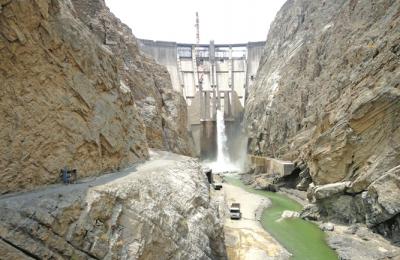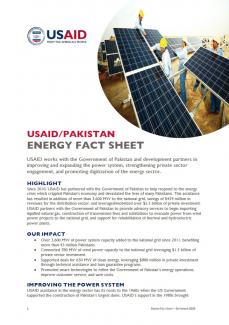The United States Agency for International Development (USAID) is partnering with the Government of Pakistan to help meet Pakistan's growing energy needs and combat climate change by transitioning to sustainable clean energy. Our support aims to increase the energy sector's sustainability by improving the power system's resilience, reducing greenhouse gas emissions, boosting private sector investment, and promoting new and innovative technologies.
SECTOR BACKGROUND
Since 2010, USAID has partnered with the Government of Pakistan (GOP) to address the energy demand and supply crisis that has crippled the country's economy and disrupted the lives of many of its citizens. Today, in partnership with the GOP, we are increasing power system capacity, creating the necessary policy, legal, and regulatory frameworks to attract private investment in clean energy, increase energy efficiency, and expand energy access. USAID supports Pakistan's transition to affordable and sustainable energy that reduces emissions, spurs economic growth, and provides power to businesses and health and education systems.
SECTOR PRIORITIES
Expanding The Power System Through Digitalization of the Energy Sector
USAID projects are supporting the Government of Pakistan by introducing several new technologies to improve the transmission and distribution of energy. These include but are not limited to technical assistance in preparing transmission expansion plans, introducing smart meters, providing new technology to manage the power supply, and automated billing systems. These technologies have led to an increase in the public sector distribution companies' revenue by over $450 million. The Pakistani government is also investing tens of millions of dollars from its funds to expand some of the technologies that USAID introduced in Pakistan. These technologies will help the GOP ensure energy security through improved revenue collection while improving customer service delivery.
Boosting Private Sector Investment
The Government of Pakistan is aggressively pursuing large-scale renewable energy investments to meet the rising energy demand and its clean energy goals. To support this venture, USAID is fostering an environment that supports private sector participation in the energy sector. These efforts include infrastructure development, creating conducive policies and regulatory frameworks, enhancing competitive procurement, providing access to finance, demonstrating partnership models, and contributing other valuable products and services such as loan guarantees. Since 2010, USAID has helped develop the first wind corridor in Pakistan, leveraged $2.6 billion million in private investment, and supported two-thirds of Pakistan's current renewable energy capacity (excluding hydropower).
Reducing Emissions
USAID has continued supporting the Government of Pakistan to meet its goal of increasing the share of renewable energy from the current 34% (including hydropower) to 61% by 2030. Since 2010, USAID has provided infrastructure support, advised the GOP on creating space for renewables in Pakistan's energy portfolio, supported the addition of 31 wind and solar energy projects, and built/rehabilitated four hydropower projects. These efforts will reduce carbon dioxide equivalent emissions by over 55 million tons in 15 years. This significant increase in renewable energy capacity will significantly reduce greenhouse gasses, help Pakistan meet its national climate goals, and reduce its vulnerability to climate change. In addition, USAID is supporting the transition of the transport sector to help the Pakistan Government achieve the goal of 30% electric vehicles in new sales by 2030 through advisory services and policy and regulatory support.
KEY RESULTS
- Enhanced energy access for 47.8 million people.
- Added 4,064 megawatts of power capacity to the national grid through generation and transmission projects.
- Leveraged over $2.729 billion of investment through infrastructure support and advisory services to help private-sector complete wind and solar projects.
- Constructed 288 km of power transmission lines, connecting Pakistan’s first wind energy corridor to the national grid.
- Supported the implementation of over 30 policies and regulations that strengthened the clean energy sector.
- Reduced or avoided 55 million tons of projected greenhouse gas emissions in 15 years.


